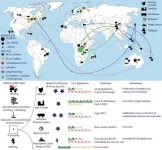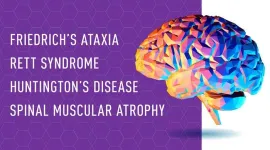(Press-News.org) More than 100,000 Master of Business Administration students graduate each year in the United States, and all of them take at least one strategy course. Even so, little is known about the effects of the degree’s most popular course offering.
Strategy courses typically focus on frameworks and cases that develop decision-making abilities for eventual MBA graduates, who make up most associates and partners at leading consulting firms, as well as 40% of the chief executive officers of publicly traded firms in the U.S. A new University of Washington study, published online June 5 in Organization Science, analyzes the value of an MBA education by examining what individuals learn from strategy courses and how those outcomes depend on individual characteristics.
Researchers found that strategy courses improve decision-making abilities, boost the amount of attention paid to broader industry concerns and expand the depth of mental representations, which allows individuals to see more of a problem’s details. The classes also increase confidence while making students more aware of uncertainties. The magnitude and significance of the results are impacted by other factors, including cognitive ability, prior knowledge and gender.
“After taking the class, we observe that students, in general, think more broadly and more deeply about different aspects of strategy,” said Mana Heshmati, co-author and assistant professor of strategy and entrepreneurship in the UW Foster School of Business. “We noticed that students also become more aware of non-consumer dimensions and industry attributes, implying they’re taking themselves out of the consumer perspective and seeing the larger picture.”
The study centered around two research questions: What do students learn from a strategy course, and how do learning outcomes depend on individual characteristics? To answer them, researchers examined how 2,269 MBA students at a large U.S. business school evaluated real-world strategies at business firms both before and after taking the core strategy course.
Participants were shown videos of real startups that raised money through Kickstarter and then decided whether to invest in the company. The activity was designed to mimic managers who must determine whether a strategy is good and then justify their decision. The students were assessed in terms of the quality of their decisions as well as their mental representations and self-perceptions.
“I think a key term here is naturalistic,” said Felipe Csaszar, co-author and professor of strategy at the University of Michigan. “This activity is something that happens a lot of the time in strategy settings where you have multiple alternatives and you must pick the best one, and those alternatives are not super clear. We know which companies were successful. Students do not, because these are small companies that they are not familiar with.”
The researchers assessed the performance of students by measuring their ability to predict a firm's success and the extent of their opinions. The researchers evaluated mental representations through the list of pros and cons students created for each company. Confidence and perceived difficulty levels were used to assess self-perception.
The results indicated that taking a strategy course has several positive effects. Students improve their accuracy by 7% on average, meaning they can distinguish between good and bad strategies more effectively. They also pay more attention to details that are not directly noticeable to consumers. Researchers found that, by the end of the course, students felt the task was less difficult and their confidence levels increased.
“Because we have shown how you can measure the course’s value, I can now think of different ways that people could improve the course,” Csaszar said. “I could even imagine schools trying different ways of teaching the course and creating some competition. These courses have an impact on the people that we teach and the things they end up doing.”
Personal history and background also impacted the results. Those with higher GMAT scores showed greater improvement in performance by the end of the course. Those with less prior business knowledge—women and engineers, in this case—experienced significant changes in both performance and mental representations. However, when it came to self-perception, women remained less confident and found the course more difficult than men.
“It was really enlightening for me to see these demographic differences affect learning in the classroom above and beyond the main effects that we looked at,” said Heshmati. “It has given me some insight into our teaching and the ways that I can hopefully improve learning in the classroom for everyone.”
##
For more information, contact Heshmati at heshmati@uw.edu.
END
UW research shows real-world value of strategy courses for MBA students
2023-06-07
ELSE PRESS RELEASES FROM THIS DATE:
Measuring greenhouse gas from ponds improves climate predictions
2023-06-06
ITHACA, N.Y. – Shallow lakes and ponds emit significant amounts of greenhouse gases into the atmosphere, but emissions from these systems vary considerably and are not well understood.
Now, a new Cornell University-led study measures methane and carbon dioxide emissions from 30 small lakes and ponds (one acre or less) in temperate areas of Europe and North America, revealing that the smallest and shallowest bodies of water exhibit the greatest variability over time.
The paper marks an important step toward calibrating climate models so they better predict emissions from inland waterbodies, and it points to the need to study small waterbodies more closely.
“This ...
Cobalt mineralogy at the Iron Creek deposit, Idaho cobalt belt, USA: Implications for domestic critical mineral production
2023-06-06
Contributed by Laura Fattaruso, GSA Science Communication Fellow
Boulder, Colo., USA: A new study published in Geology evaluates the potential for cobalt extraction from the Idaho Cobalt Belt (ICB) of east-central Idaho, using a detailed study of the Iron Creek deposit. The ICB hosts the second largest known domestic resource of the critical mineral cobalt, one of the key ingredients in many rechargeable batteries needed for the green energy transition. Demand for cobalt is projected to increase more than 500% by 2050. Roughly 70% of the cobalt mined globally is from the Democratic Republic of the Congo, where mining practices have been criticized for human rights violations including ...
Predictive models show wildlife managers where to find destructive feral swine
2023-06-06
UNIVERSITY PARK, Pa. — Feral swine are considered one of the top invasive species of concern in North America because of the damage they do to agricultural and natural systems. To best manage them, resource management agencies need to know more precisely where and when to implement control methods. A new study by a Penn State-led research team developed a method to help guide control efforts in the Great Smoky Mountains National Park.
Descended from wild European boars imported centuries ago that bred with escaped domestic pigs, feral swine cause widespread damage to ecosystems by wallowing ...
Revolutionizing optical control with topological edge states
2023-06-06
Nanophotonics and topology have gained significant interest due to the unique properties they offer. One area of focus is the investigation of topological edge states (TESs). These states have captured widespread attention because they are very resistant to errors and imperfections. Arising from topologically nontrivial phases, TESs provide a powerful toolkit for the architectural design of photonic integrated circuits. TES transport has led to the discovery of various intriguing optical effects and applications, including directional couplers, one-way waveguides, mode-locked waveguides, ...
Research to develop new rare disease therapies underway at The Jackson Laboratory
2023-06-06
Researchers led by Cathleen Lutz, Ph.D., are using an exciting new method, preclinical genomic editing, to develop safe, effective therapies for rare diseases and bring them to the clinic.
Unfortunately, the translation of the accumulated knowledge to safe and effective therapies has lagged. There are many reasons to predict that the situation is changing for the better, however, as powerful new gene-based therapies succeed in clinical trials and receive FDA approval.
Therapeutic strategies such as gene replacement and gene modulation (e.g., blocking protein production with anti-sense oligonucleotides) are at the forefront of the recent progress. ...
Elizabeth Anderson and Alondra Nelson win 2023 Sage-CASBS Award
2023-06-06
Sage and the Center for Advanced Study in the Behavioral Sciences (CASBS) at Stanford University are pleased to announce Elizabeth Anderson and Alondra Nelson as winners of the 2023 Sage-CASBS Award.
Established in 2013, the Sage-CASBS Award recognizes outstanding achievement in the behavioral and social sciences that advances our understanding of pressing social issues. It underscores the role of the social and behavioral sciences in enriching and enhancing public discourse and good governance. Past winners of the award include Daniel Kahneman, psychologist and Nobel laureate in economic sciences; Pedro ...
Study: Doing good for others is good for children’s and teens’ mental, physical health
2023-06-06
Children and teenagers who volunteer tend to flourish mentally and physically, according to a new study from UTHealth Houston.
The study, led by Kevin Lanza, PhD, assistant professor of epidemiology, human genetics, and environmental sciences at UTHealth Houston School of Public Health, was published recently in JAMA Network Open.
Overall, the research team found that youths who had volunteered in the past year were in better physical health, had a more positive outlook on life, and were less likely to have anxiety, depression, or behavioral problems compared to their peers who did not volunteer.
“These study results bring optimism that youth volunteering could be ...
Health equity is the focus of LBGTQ+ Pride Month celebrations across the country
2023-06-06
DALLAS, June 6, 2023 — According to a study recently published in the Journal of the American Heart Association, lesbian and bisexual women in France had poorer heart health than heterosexual women, a finding that could be attributed to discrimination and other stressors faced by the LGBTQ+ community. In support of Pride Month, the American Heart Association, a global force for longer, healthier lives for all, is promoting awareness and health education for all people across the spectrum of diversity, including those who identify as LGBTQ+.
For more than 50 years, the LGBTQ+ community has spent the month of June ...
Order in chaos: Atmosphere’s Antarctic oscillation has natural cycle
2023-06-06
HOUSTON – (June 6, 2023) – Climate scientists at Rice University have discovered an “internally generated periodicity” — a natural cycle that repeats every 150 days — in the north-south oscillation of atmospheric pressure patterns that drive the movement of the Southern Hemisphere’s prevailing westerly winds and the Antarctic jet stream.
“This is something that arises from the internal dynamics of the atmosphere,” said Pedram Hassanzadeh, co-author of a study about the discovery in the open-access journal AGU Advances. “We were playing with some new equations that we had derived ...
Recent papers in ACS Measurement Science Au
2023-06-06
ACS Measurement Science Au is a member of the ACS Au family of journals. These publications are open access, and each one focuses on a specific field relevant to chemistry. Here, we take a look at a few recent papers from ACS Measurement Science Au, which publishes experimental, computational or theoretical research in all areas of chemical measurement science. The journal welcomes papers on any phase of analytical operations, such as sampling, measurement and data analysis.
“Colorimetric Signal Readout for the Detection of Volatile Organic Compounds Using a Printable Glass-Based ...



